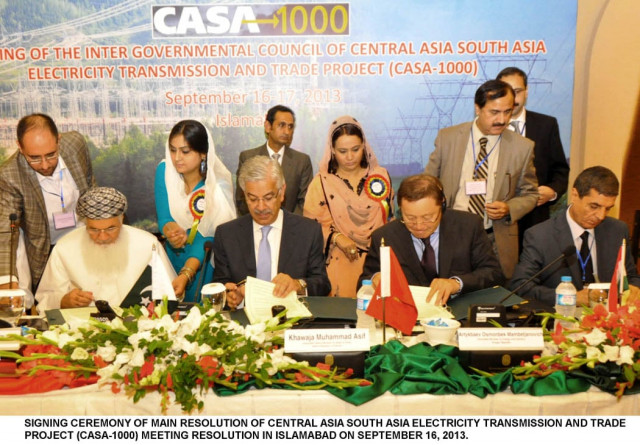CASA-1000 project: Accord reached on structure and commercial principles
Stakeholders expected to start developing the project in 2014.

The four countries that are part of Central Asia-South Asia 1000 power import project signed an inter-governmental council resolution after two days of meetings. PHOTO: PID
In this regard, they signed an inter-governmental council resolution after two days of meetings, says a statement issued here on Monday.
Pakistan hosted the meetings of the Inter-Governmental Council (IGC) for the Central Asia-South Asia Electricity Transmission and Trade Project, known as CASA-1000. The four participating governments – Afghanistan, Kyrgyzstan, Tajikistan and Pakistan – signalled their commitment to the landmark project by signing the IGC resolution at the ministerial level.

CASA-1000 will facilitate first electricity trade between the four countries in Central Asia and South Asia, based on long-term commercial contracts for export of 1,300 megawatts from Kyrgyzstan and Tajikistan to power consumers in Afghanistan and Pakistan.
An investment of $1 billion will be made to create conditions for sustainable hydropower trade to ease shortages in importing countries while enhancing sector and budget revenues in exporting countries.
“We sincerely hope that realisation of CASA-1000 will take us a long way in developing further the relationship between Central Asian and South Asian countries,” said Khawaja Muhammad Asif, Minister of Water and Power.
Pakistan officials noted that CASA-1000 could ease electricity shortages in peak summer season when consumer demand reached the highest mark and reduce the country’s reliance on costly, carbon-intensive oil-based generation.

Afghan officials highlighted how important the project was in establishing the country’s role as a viable transit nation and enhancing its growth prospects at a critical time.
Representatives of Tajikistan and Kyrgyzstan welcomed the project, believing it would serve as a potential source of generating fiscal and power sector revenues that could be used to address their acute energy shortages in winter.
Through the IGC, the four countries are working together to arrive at decisions on project implementation and operation, policies and rules, and technical, safety and environmental standards.
Preparations for the project were discussed during the two-day deliberations, with progress made on plans to negotiate commercial agreements, environment and social safeguard documents and host public consultations later this year.
The meeting participants agreed that an implementation plan for community benefit-sharing during construction and operation would need to be developed in coming months.
Legal consultants presented an update on the preparation of important agreements, including the master agreement, power purchase agreements and coordination agreement.
Other preparatory activities pertaining to financing, selecting a developer and operator, finalising environmental and social assessment and a benefit-sharing plan for communities living around the corridor of the transmission line were discussed.
Earlier activities have been financed by and coordinated with the Australian Agency for International Development, US State Department and USAID, UK Department for International Development, Asian Development Bank, Islamic Development Bank and the World Bank Group.
Published in The Express Tribune, September 17th, 2013.
Like Business on Facebook, follow @TribuneBiz on Twitter to stay informed and join in the conversation.



















COMMENTS
Comments are moderated and generally will be posted if they are on-topic and not abusive.
For more information, please see our Comments FAQ